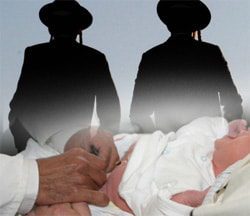
Federal health officials have issued a warning about the risk of a potentially life-threatening herpes risk associated with an ultra-Orthodox Jewish circumcision ritual. According to an MSNBC.com report this week, the Centers for Disease Control and Prevention (CDC) have issued a public alert regarding metzizah b’peh, a rare circumcision ritual in which the mohliem uses […]
 Federal health officials have issued a warning about the risk of a potentially life-threatening herpes risk associated with an ultra-Orthodox Jewish circumcision ritual.
Federal health officials have issued a warning about the risk of a potentially life-threatening herpes risk associated with an ultra-Orthodox Jewish circumcision ritual.
According to an MSNBC.com report this week, the Centers for Disease Control and Prevention (CDC) have issued a public alert regarding metzizah b’peh, a rare circumcision ritual in which the mohliem uses his mouth to clean the blood away from the surgery site, a procedure known as orogenital suction. From 2000 until 2011, the CDC reports that 11 babies in New York City were confirmed to have have contracted herpes following this ritual. All but one required hospitalization and two died.
In some cases, parents of children who received metzizah b’peh were not aware that it would be performed on their child at the time of the circumcision and almost none of the parents were aware of the herpes risk that was associated with it. Although most adults carry the virus – most commonly associated with cold sores – the health risks posed by it to infants is much more severe.
This rare ritual came to light recently in New York City when its Health Dept. banned one mohliem from performing it because three children who received metzizah b’peh from him contracted herpes, including one fatal case of the virus.
The CDC warned that placing the mouth on an open wound, especially that of an infant, greatly increases the risk of transmitting the herpes virus. The agency believes between three and eight mohliem performed the circumcisions which led to the viral infections. Most parents who allowed the procedure to continue refused to identify the mohliem who performed it to the CDC as part of its investigation.
Nearly 25 in 100,000 boys who have orogenital suction performed during their circumcision will develop herpes virus infection. These infections are exclusively within the ultra-Orthodox religion. Newborn boys who have a traditional circumcision are three-times less likely to develop infection.
The CDC warns that parents considering having an out-of-hospital circumcision performed on their child be aware of the life-threatening risks those procedures pose to their child. Early signs that a newborn has developed a viral infection following the circumcision is the onset of fever. And the agency further warns mohliem still performing metzizah b’peh that they should be forthcoming about the health risks posed by the ceremony. Also, they should be open about their intent to perform the circumcision in this manner since so many parents said they were unaware it would be done.


